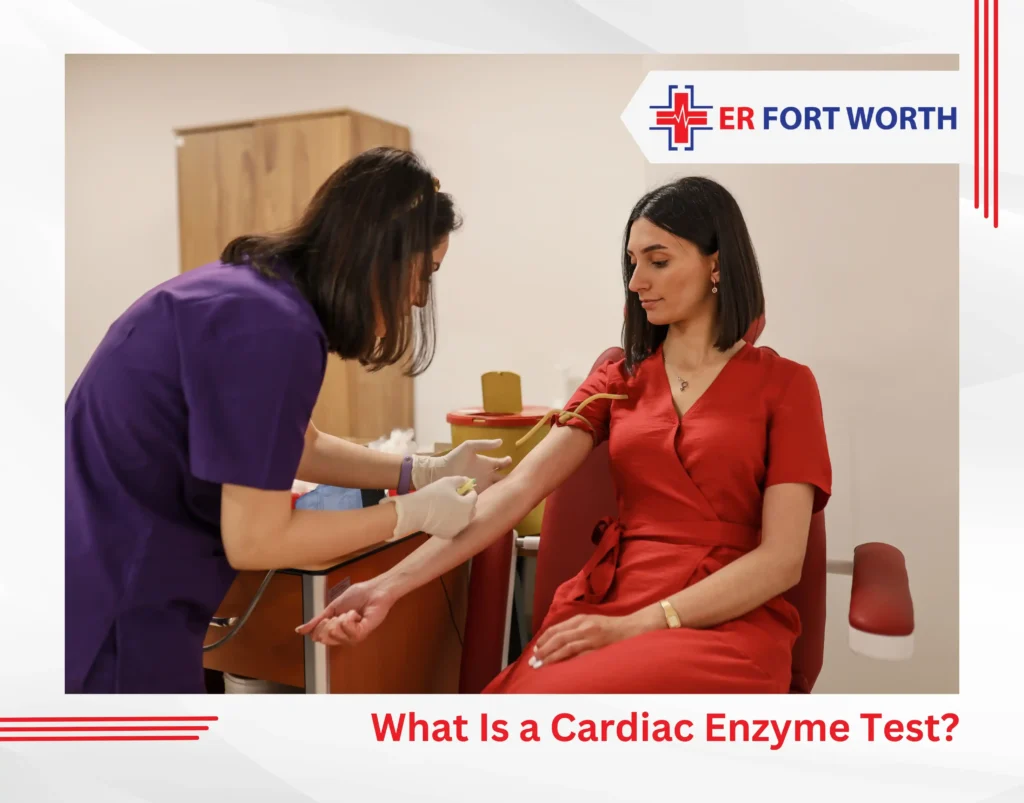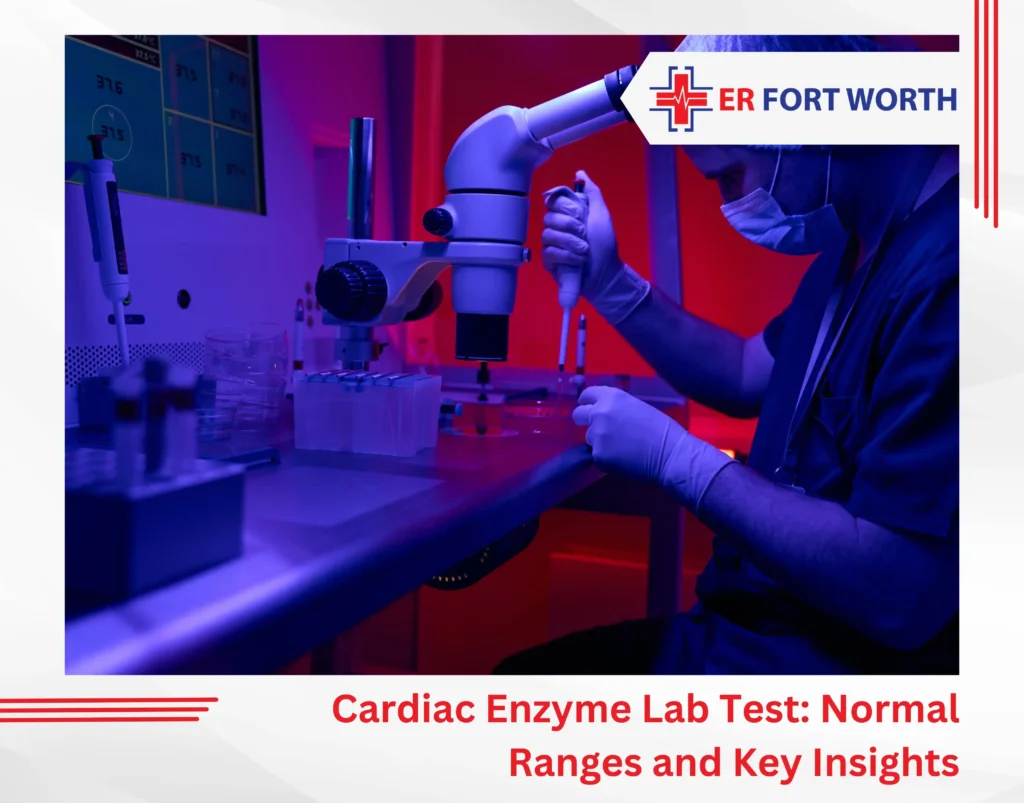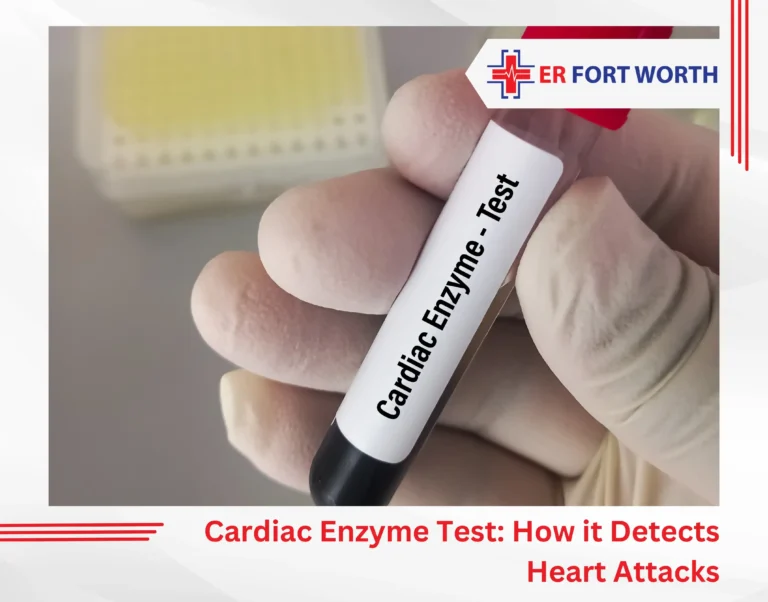When you arrive at our ER with possible heart attack symptoms, a Cardiac Enzyme Test can reveal what’s really happening inside your heart. This blood test detects specific proteins that leak into your bloodstream when heart muscle is damaged.
At ER of Fort Worth, we run these crucial tests within minutes of your arrival, alongside ECGs and other diagnostics. The results help us determine if you’re having a heart attack and guide our immediate treatment decisions.
Let’s explore how a cardiac enzyme test works, what normal ranges look like, and why timing matters in detecting heart attacks.
What Is a Cardiac Enzyme Test?

A cardiac enzyme test measures specific proteins and enzymes in your blood that signal heart muscle damage. The most important of these is troponin, which leaks into your bloodstream when heart cells are injured.
Think of these enzymes as warning signals. When they rise, it often means your heart needs immediate attention. While high enzyme levels often point to a heart attack, they can also rise due to other conditions like:
- Severe heart strain from prolonged exercise
- Blood clots in the lungs (pulmonary embolism)
- Fast heart rhythms (tachycardia)
- Heart muscle inflammation
- kidney disease
- Heart failure
- Heart or chest trauma
- deterioration of the heart muscle
- Open-heart surgery
- Cardiac procedures like ablation
Our ER doctors measure these enzymes in nanograms per milliliter (ng/mL). The higher the levels, the more likely there’s serious heart damage that needs immediate treatment.
The Procedure: Cardiac Enzymes Blood Test
The Cardiac Enzymes Blood Test is an essential and straightforward procedure that yields critical information regarding heart health, especially in emergency situations such as suspected myocardial infarctions. Below is a detailed overview of each phase of the procedure:
Preparation
A notable benefit of this test is that it typically does not require any special preparations, which enhances its utility in urgent circumstances.
Nonetheless, it is crucial to:
- Notify your healthcare provider about any medications, supplements, or pre-existing conditions that may influence the results.
- Remain composed, as anxiety can affect heart-related symptoms, although it does not alter enzyme levels directly.
Blood Sample Collection
A qualified healthcare professional will:
- Disinfect the area, usually the inner elbow or the back of the hand, to minimize the risk of infection.
- Insert a needle to extract blood from a vein.
- Carefully label the sample to ensure precise processing.
In cases where patients are in distress, such as those experiencing chest pain, this step is often expedited to reduce treatment delays.
Laboratory Analysis
Upon arrival at our health services laboratory, the sample undergoes:
- Measurement of enzyme and protein levels, including troponin and creatine kinase (CK-MB). Elevated levels typically suggest damage to the heart muscle.
- Comparison of results against established normal ranges, which may vary slightly based on the laboratory’s protocols.
Interpretation and Diagnosis
The results are not interpreted in isolation. They are analyzed in conjunction with:
- Symptoms such as chest pain, shortness of breath, or dizziness.
- Other diagnostic assessments, including ECG results or imaging studies, to verify the presence and severity of heart damage.
Cardiac Enzyme Lab Test: Normal Ranges and Key Insights

The cardiac enzymes lab test is an essential diagnostic instrument for recognizing harm to heart muscle. By evaluating specific proteins and enzymes present in the bloodstream, it assists healthcare professionals in identifying conditions such as heart attacks.
Understanding the cardiac enzyme test normal range is crucial for accurately interpreting these findings and effectively diagnosing cardiac issues.
Troponin
- Normal Range: Under 0.04 ng/mL.
- Importance: Troponin is the most specific and dependable marker for damage to the heart muscle. Levels exceeding the cardiac enzyme test normal range strongly suggest a heart attack or significant cardiac injury.
- Timing: Troponin levels might appear normal at first if the test is done too soon after heart injury. Subsequent testing, typically performed within 4–9 hours, is often necessary to verify changes. High-sensitivity troponin tests can identify even minor increases earlier, facilitating quicker diagnosis.
CK-MB (Creatine Kinase-MB
- Normal Range: 3–5% of total CK levels.
- Importance: CK-MB serves as a marker for heart muscle injury but is not as specific as troponin. It may also be affected by skeletal muscle disorders.
- Timing: CK-MB levels rise within 4–6 hours after injury and peak at 12–24 hours. Observing trends through repeat tests provides valuable insights.
Myoglobin
- Normal Range: Below 85 ng/mL.
- Importance: Myoglobin is the initial marker to increase, often detectable within 2–3 hours of heart muscle damage. However, it is not specific to the heart and may also rise due to skeletal muscle injuries.
- Timing: While it allows for early detection, confirmation through additional markers like troponin is vital.
How It Helps Detect Heart Attacks

When a heart attack occurs, the blood supply to the heart muscle is obstructed, resulting in cellular damage. This damage triggers a swift release of enzymes such as troponin into the bloodstream. The cardiac enzyme test is crucial because of the following:
- Timely Detection: Troponin levels may increase as soon as 4-6 hours post-heart attack, allowing for quick diagnosis.
- Tracking Progress: Multiple tests over time can monitor fluctuations in enzyme levels, showing whether heart damage is continuing or healing.
- Informing Treatment: The findings assist doctors in assessing the heart attack’s severity and selecting suitable treatments, such as medications or surgical procedures.
The cardiac enzyme test is an essential resource for identifying heart attacks, providing accurate and timely information regarding heart health. By assessing crucial indicators like troponin, CK-MB, and myoglobin, it effectively assists in recognizing and tracking heart muscle injury.
When utilized in conjunction with other assessment techniques, such as ECGs, the cardiac enzymes lab test provides a thorough evaluation of cardiac events, enabling prompt and life-saving interventions.
If you or a loved one experiences signs such as chest discomfort or difficulty breathing, do not hesitate. Seek immediate medical attention at ER of Fort Worth, where rapid testing and expert care can make all the difference.
Request a Cardiac Enzyme Test Now
FAQs
What is the 3-hour rule for troponin?
The 3-hour rule for troponin involves measuring troponin levels at the time of presentation and again three hours later. A notable increase or decrease in levels during this time frame can help verify or exclude a heart attack, allowing for quicker diagnosis and intervention.
How do I know if my heart is ok?
Pay attention to symptoms like chest pain or shortness of breath and keep track of vital signs such as blood pressure and heart rate. Regular check-ups and a healthy lifestyle are key to ensuring your heart is in good condition.
Can a weak heart become strong again?
A weak heart can often become stronger with proper treatment, such as medications, lifestyle changes like a healthy diet and exercise, and managing underlying conditions.




